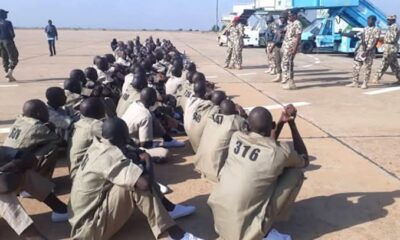The Federal Government has said it will implement 30 per cent of the 2025 capital budget before the end of November, as part of measures to fast-track project execution and clear outstanding obligations.
It also stated that the remaining 70 per cent has been rolled over into the 2026 capital budget to ensure seamless implementation. The move follows a directive to Ministries, Departments, and Agencies to comply strictly with procurement rules in the execution and payment of capital projects under the extended 2025 budget cycle.
In a statement on Thursday by the Director of Press and Public Relations at the Office of the Accountant-General of the Federation, Bawa Mokwa, the government said MDAs had been instructed to align fully with the Public Procurement Act in implementing the 2025 and 2026 capital budgets.
The Minister of State for Finance, Mrs Doris Uzoka-Anite, gave the directive during a stakeholders’ meeting on the implementation of the extended 2025 Capital Budget held at the Federal Ministry of Finance in Abuja.
She stressed that capital disbursements must follow due process.
The statement read, “Mrs Uzoka-Anite emphasised that all capital payments must comply with the principles of the Procurement Act and that capital projects must be backed by cash before execution. She warned that no capital payment should be processed outside approved procurement procedures.”
She added that the country has sufficient funds to settle outstanding obligations and urged MDAs to update their documentation to enable quicker processing of payments.
The statement noted, “The Minister further stated that the nation has adequate funds to settle pending payments and urged MDAs to review and update their documentation to facilitate the timely processing of payments.”
Providing further details, the Accountant-General of the Federation, Dr Shamseldeen Ogunjimi, disclosed that the Government Integrated Financial Management Information System had been fully restored.
Ogunjimi reiterated that warrants had already been issued to MDAs and announced that Treasury House would begin implementation of the 30 per cent component of the 2025 budget by the end of next week.
The statement read, “Dr Ogunjimi explained that 30 per cent of the 2025 Capital Budget will be implemented between now and 30 November 2026, while the remaining 70 per cent has been rolled over into the 2026 Capital Budget to ensure seamless implementation, in line with the directive of President Bola Tinubu.
“He reiterated that warrants have already been issued to MDAs and announced that Treasury House will commence implementation of the 30 per cent component of the 2025 Budget by the end of next week.”
The decision effectively means that a significant portion of last year’s capital allocations will now be executed within the current fiscal window, while the bulk has been carried forward into the 2026 capital framework to avoid disruption of ongoing projects.
Earlier in his welcome address, the Director of Funds, Mr Steve Ehikhamenor, cautioned MDAs against exceeding approved allocations. He urged them to avoid budget overruns and to adhere strictly to approved project items and their corresponding values.
He also advised agencies not to exceed the amounts specified in their warrants, to return any unutilised or excess funds to the Treasury, and to work closely with GIFMIS officials for technical support.
The PUNCH earlier in December 2025 exclusively reported that the Federal Government ordered ministries, departments, and agencies to carry over 70 per cent of their 2025 capital budget into the 2026 fiscal year as the administration moved to prioritise the completion of existing projects and contain spending pressures in the face of weak revenues.
The directive was contained in the 2026 Abridged Budget Call Circular issued by the Federal Ministry of Budget and Economic Planning and circulated to ministers, service chiefs, heads of agencies, and other senior government officials in Abuja.
The circular stated that only 30 per cent of the 2025 capital budget would be released within the year, while the remaining 70 per cent would form the basis of the 2026 capital budget, replacing the traditional rollover approach.
However, the Federal Government did not release the 30 per cent earmarked for 2025, resulting in its deferral into 2026, as ministers raised concerns over the non-release of funds for capital projects.
The PUNCH earlier reported that ministers in charge of key infrastructure and service-delivery agencies are grappling with a severe funding squeeze, as figures showed that MDAs received less than N1tn for capital projects in the first seven months of 2025.
The data used for this report was the most up-to-date available from the Budget Office of the Federation, as the agency had yet to release comprehensive full-year implementation figures, despite the fiscal year being well advanced.
An analysis of data from the Budget Office of the Federation’s Medium-Term Expenditure Framework and Fiscal Strategy Paper (2026–2028) showed that while N18.53tn was appropriated for capital expenditure for “MDAs and others” in 2025, the January–July pro rata benchmark stood at N10.81tn.
However, actual capital releases to MDAs and related entities during the period amounted to just N834.80bn. That left a pro rata shortfall of about N9.98tn and a performance rate of only 7.72 per cent within the seven-month window.
punch.ng
FOLLOW US ON:
FACEBOOK
TWITTER
PINTEREST
TIKTOK
YOUTUBE
LINKEDIN
TUMBLR
INSTAGRAM































